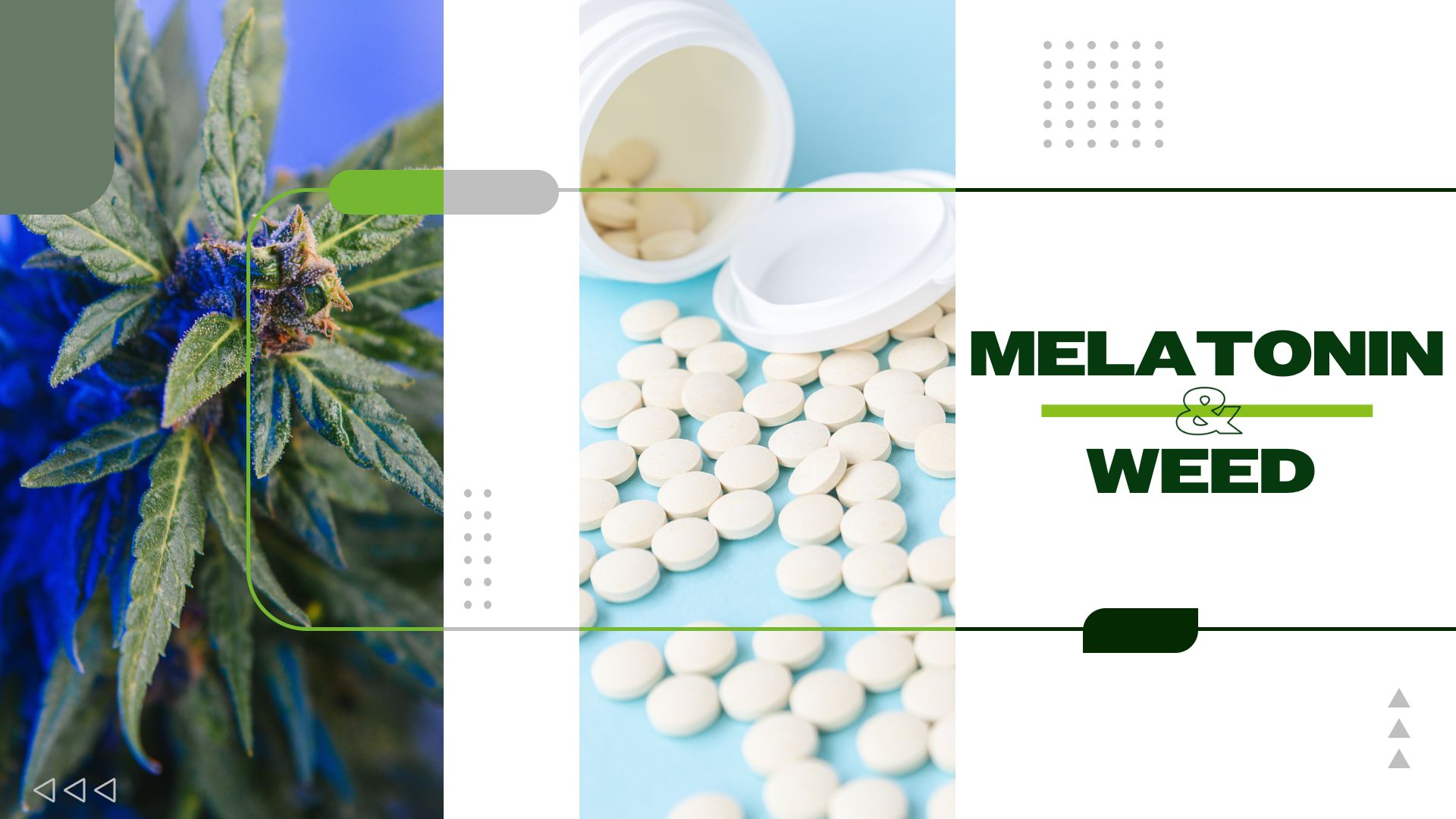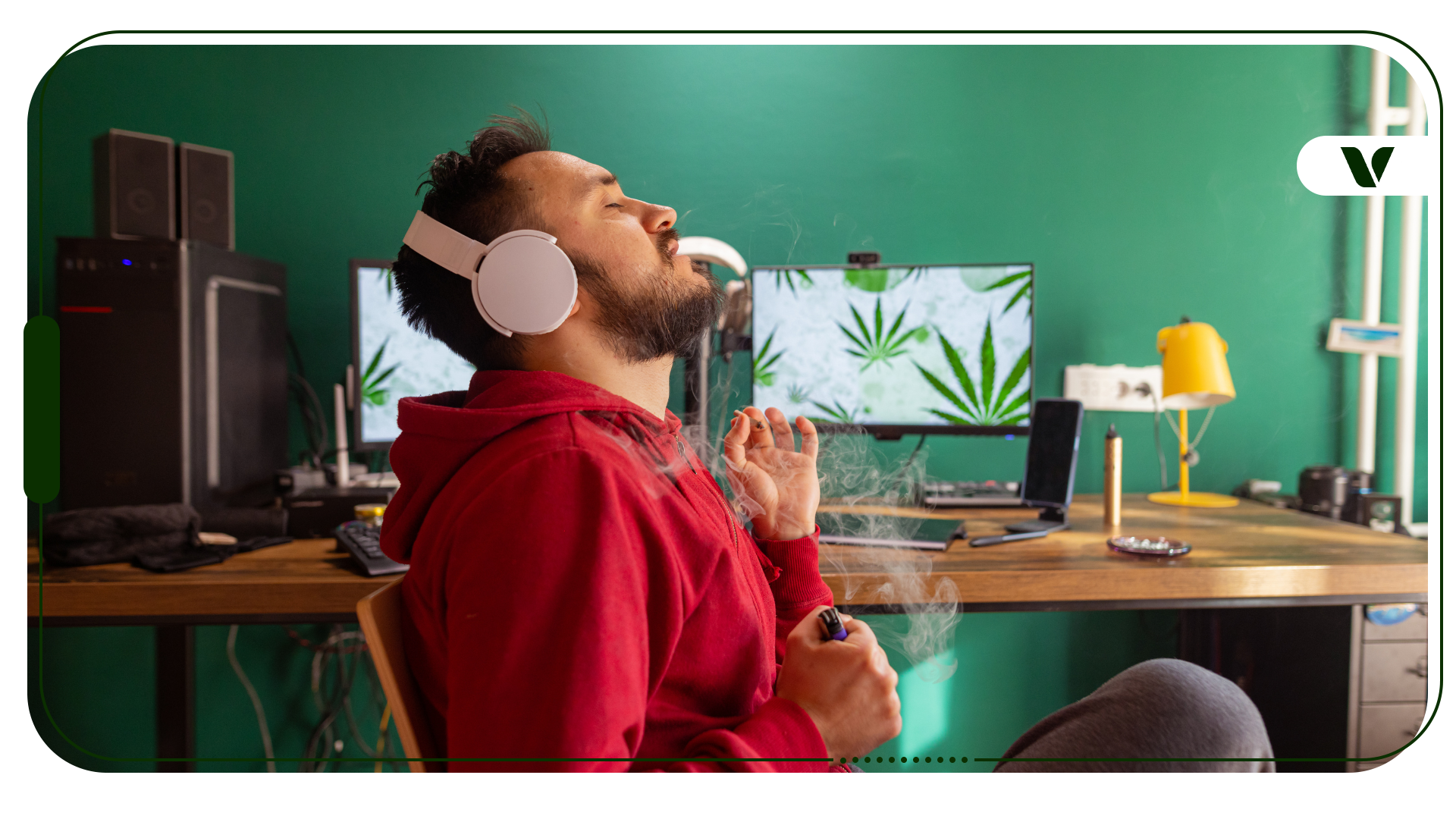Do you ever have trouble falling asleep, or wake up tossing and turning in the middle of the night? If so, research shows you are not alone. Statistics from the National Sleep Foundation have found that 10–30% of adults struggle with insomnia.
Currently, the NSF recommends seven to nine hours of sleep per night for adults aged 18-64, and seven to eight hours for those over 65. Unfortunately, over one-third of Americans admit to sleeping less than seven hours per night on average.
As a result, those who struggle with sleep issues are turning to supplements like melatonin or even cannabis for relief. But what happens when you mix the two? Is it a magical sleep solution or a risky combo? The idea of combining these two substances might seem appealing, but it’s important to understand both the potential benefits and risks.
Let’s dive in and explore if it’s safe to mix melatonin and weed.
What is Melatonin?
Melatonin is a hormone naturally produced by your body. It comes from the pineal gland in your brain and plays a key role in controlling the sleep-wake cycle, also known as your circadian rhythm. Essentially, melatonin helps signal to your body that it’s time to go to sleep.
People often take melatonin supplements when they have trouble sleeping, anxiety before or after surgery, or if they know their routine is about to be interrupted. This can be due to various reasons, such as jet lag from traveling, working night shifts, or general sleep disorders like insomnia.
Melatonin is available in many forms, including pills, gummies, and liquids, with typical dosages ranging from 0.1 to 10 milligrams. It is generally considered safe for short-term use, but its long-term effects are still being studied.
How Does Cannabis Affect Sleep?
Cannabis contains well-known elements like THC (tetrahydrocannabinol) and CBD (cannabidiol) along with many other lesser-known cannabinoids. These compounds interact with the endocannabinoid system (ECS) in our bodies, which plays a role in regulating mood, appetite, and yes, sleep.
According to 2023 research published in the journal Cannabis and Cannabinoid Research, cannabinoids like THC and CBD show amazing potential for helping alleviate common sleep disorders. CBN (cannabinol) is also thought to play a significant role in helping folks catch extra z’s, and is commonly referred to as the “sleepy cannabinoid.” However, CBN evidence remains to be clearly demonstrated in clinical studies, and the reality is that CBN works best with THC present.
Additionally, since cannabis can be consumed in several ways, such as smoking, eating edibles, or using oils, it’s helpful to keep in mind that each method has different onset times and durations of effects. These differences can influence how cannabis impacts sleep.
Potential Interactions Between Melatonin and Cannabis
Both melatonin and cannabis can help with sleep, but they work in different ways. Melatonin adjusts your internal clock, signaling to your body that it’s bedtime. Cannabis, on the other hand, interacts with receptors in your brain to induce relaxation and drowsiness.
Combining melatonin and cannabis might seem like a good idea if you’re struggling to sleep. While direct research into this combo is lacking, we have some idea of their individual properties and anecdotal reports that may be significant. Here are some potential interactions to consider:
Benefits:
- Enhanced Sleep Quality: Some users report that combining both substances helps them fall asleep faster and stay asleep longer.
- Relaxation: The combined effects can promote a deeper sense of relaxation, making it easier to unwind.
- Synergistic Effects: The two substances may work together to enhance each other’s sleep-promoting properties.
Risks:
- Over-Sedation: Using both may lead to excessive drowsiness, making it hard to wake up and function normally the next day.
- Dizziness: The combination can cause dizziness, especially if taken in higher doses.
- Impaired Cognitive Function: Mixing melatonin and cannabis may impair your cognitive abilities, making it difficult to concentrate and perform tasks.
It’s important to approach this combination with caution, as everyone’s body reacts differently to these products.
Scientific Research and Evidence About Combining Melatonin and Weed
Currently, there isn’t a lot of scientific research specifically on the interaction between melatonin and weed.
There’s one recent 2023 study comparing CBD and melatonin alone and in combination with each other and minor cannabinoids like CBC and CBN. They found that a low CBD dose (15 mg) had the same sleep effects as 5 mg of melatonin. The combinations and additions of CBC and CBN did not enhance results but appear safe and well-tolerated in this short-term study.
Most of what else we know comes from separate studies on cannabinoids or melatonin, individual reports, and anecdotal evidence. Some people swear by the combination, saying it gives them the best sleep they’ve ever had. Others, however, find it too strong and wake up feeling more tired than before.
Experts often have mixed opinions. Some healthcare professionals suggest that while combining melatonin and cannabis might help some people, it’s essential to proceed with caution. As with most things cannabis-related, more research is needed to understand the long-term effects and safety of this combination fully.
What Are Some Key Safety Considerations to Keep In Mind?
If you’re thinking about mixing melatonin and weed, it’s crucial to do so safely. Here are some guidelines to follow:
- Start with Low Doses: Begin with the smallest possible doses of each substance to see how your body reacts. Sleep medicine agencies in the US and EU recommend a maximum dose of 1-2 mg of melatonin.
- Monitor Your Body’s Response: Pay attention to how you feel the next day. If you experience excessive drowsiness or other side effects, adjust the doses accordingly.
- Consult with a Healthcare Provider: Always talk to a doctor or pharmacist before trying new supplements or medications, especially when combining them.
- Avoid if You Have Certain Conditions: People with specific medical conditions, those who are pregnant, nursing, or individuals taking other medications that can interact with melatonin or cannabis should avoid this combination.
What Are Some Alternative Sleep Aids?
If you’re hesitant about mixing melatonin and cannabis, there are other natural sleep aids to consider. Some popular alternatives include:
Additionally, making lifestyle changes can significantly improve your sleep quality. Practicing good bedtime habits, such as going to sleep at the same time each night, relaxing before bed, and avoiding screen time in bed, can make a big difference. Exercising regularly during the daytime and avoiding naps can help with falling asleep and concentrating sleep more efficiently.
Your diet and beverage choices also play a role in how well you sleep. Try to avoid alcohol, caffeinated stimulants, and spicy and greasy foods before lying down to avoid sleep-ruining indigestion or acid reflux. On the other hand, consuming foods rich in tryptophan, magnesium, and vitamin B6 can help promote better sleep. Think along the lines of turkey, nuts, seeds, and bananas.
The Bottom Line
In summary, mixing melatonin and weed might help some people achieve better sleep, but it’s not without risks. Understanding how each works and starting with low doses is essential. Always consult with a doctor or pharmacist to ensure it’s safe for you, particularly if you’re taking other prescription medications.
While the combination could be a sleep solution for some, others might find alternative sleep aids or lifestyle changes more beneficial. Whether you choose to combine melatonin and cannabis or explore other options, the goal is the same: achieving a restful night’s sleep and waking up refreshed and ready to take on the day.
Note: The content on this page is for informational purposes only and is not intended to be professional medical advice. Do not attempt to self-diagnose or prescribe treatment based on the information provided. Always consult a physician before making any decision on the treatment of a medical condition.
Author, Share & Comments









